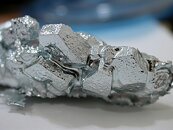T0@st
News Editor
- Joined
- Mar 7, 2023
- Messages
- 2,619 (3.56/day)
- Location
- South East, UK
| System Name | The TPU Typewriter |
|---|---|
| Processor | AMD Ryzen 5 5600 (non-X) |
| Motherboard | GIGABYTE B550M DS3H Micro ATX |
| Cooling | DeepCool AS500 |
| Memory | Kingston Fury Renegade RGB 32 GB (2 x 16 GB) DDR4-3600 CL16 |
| Video Card(s) | PowerColor Radeon RX 7800 XT 16 GB Hellhound OC |
| Storage | Samsung 980 Pro 1 TB M.2-2280 PCIe 4.0 X4 NVME SSD |
| Display(s) | Lenovo Legion Y27q-20 27" QHD IPS monitor |
| Case | GameMax Spark M-ATX (re-badged Jonsbo D30) |
| Audio Device(s) | FiiO K7 Desktop DAC/Amp + Philips Fidelio X3 headphones, or ARTTI T10 Planar IEMs |
| Power Supply | ADATA XPG CORE Reactor 650 W 80+ Gold ATX |
| Mouse | Roccat Kone Pro Air |
| Keyboard | Cooler Master MasterKeys Pro L |
| Software | Windows 10 64-bit Home Edition |
China announced on Monday (June 3) that it would restrict exports of two rare metals——both crucial materials in the computer chip manufacturing process. The nation's Ministry of Commerce stated that their new measures were necessary to "safeguard national security and interests". The Chinese government is contending with several sanctions from Western countries—most notably their access to advanced semiconductor manufacturing equipment is now heavily controlled. Reuters has contacted a number of foundries about the potential impact of rare material shipment limitations. Taiwan Semiconductor Manufacturing Company (TSMC) has shrugged it off as a minor inconvenience, their spokesperson stated: "After evaluation, we do not expect the export restrictions on raw materials gallium and germanium will have any direct impact on TSMC's production. We will continue to monitor the situation closely."
WIN Semiconductors Corp—a Taiwanese firm that specializes in the provision of gallium arsenide wafers—informed the news agency about its low-level reliance on Chinese mineral sources. They are able to sidestep and procure gallium and germanium from suppliers located in Germany, Japan, and North America. The Japanese Semiconductor Equipment Association stated that it was too early to tell whether China's export restrictions will result in material shortages. Supply chains could be disrupted to some degree due to China controlling over 90% of the world's gallium and germanium production, but DigiTimes Asia proposes that new sanctions will not prohibit production and export activities. According to experts in the field supply lines will continue to operate, with buyers required to jump through some extra hoops in order to gain approval for certain market segments. The purification of gallium and germanium is mostly controlled by American and Japanese entities—the processed form of these metals is used in semiconductor production—DigiTimes reckons that these firms will probably feel the initial impact of new trade restrictions.



Suppliers could pivot and promptly find other mineral sources, but prices are expected to be greater when compared to Chinese ores. An industry expert proposes that China could upgrade its refining operations and offer purified gallium and germanium, thus out muscling competition in the U.S and Japan. On the other hand, new restrictions could scupper these internal refinement plans. GaAs and GaN industries could be disrupted to some extent (by the latter scenario)—the DigiTimes contact suggests that suppliers should re-evaluate their reliance on a single source of ore, even if it requires shelling out a bit more cash.
View at TechPowerUp Main Site | Source
WIN Semiconductors Corp—a Taiwanese firm that specializes in the provision of gallium arsenide wafers—informed the news agency about its low-level reliance on Chinese mineral sources. They are able to sidestep and procure gallium and germanium from suppliers located in Germany, Japan, and North America. The Japanese Semiconductor Equipment Association stated that it was too early to tell whether China's export restrictions will result in material shortages. Supply chains could be disrupted to some degree due to China controlling over 90% of the world's gallium and germanium production, but DigiTimes Asia proposes that new sanctions will not prohibit production and export activities. According to experts in the field supply lines will continue to operate, with buyers required to jump through some extra hoops in order to gain approval for certain market segments. The purification of gallium and germanium is mostly controlled by American and Japanese entities—the processed form of these metals is used in semiconductor production—DigiTimes reckons that these firms will probably feel the initial impact of new trade restrictions.



Suppliers could pivot and promptly find other mineral sources, but prices are expected to be greater when compared to Chinese ores. An industry expert proposes that China could upgrade its refining operations and offer purified gallium and germanium, thus out muscling competition in the U.S and Japan. On the other hand, new restrictions could scupper these internal refinement plans. GaAs and GaN industries could be disrupted to some extent (by the latter scenario)—the DigiTimes contact suggests that suppliers should re-evaluate their reliance on a single source of ore, even if it requires shelling out a bit more cash.
View at TechPowerUp Main Site | Source





